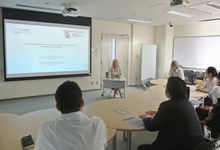第92回客員教授セミナー
アカデミックリーダーの能力開発
-同僚性とマネジリアリズムの狭間で-
Maria Slowey 氏
アイルランド ダブリンシティ大学・教授
2018年10月25日(木)15:00~17:00
名古屋大学 東山キャンパス 文系総合館5階 アクティブラーニングスタジオ
 開催案内
開催案内
第92回客員教授セミナー
- 講演題目
- アカデミックリーダーの能力開発
-同僚性とマネジリアリズムの狭間で- - 講演者
- Maria Slowey 氏(アイルランド ダブリンシティ大学・教授)
- 日時
- 2018年10月25日(木)15:00~17:00
- 場所
- 名古屋大学 東山キャンパス 文系総合館5階 アクティブラーニングスタジオ
- 使用言語
- 英語
講演概要
知識基盤社会では大学への期待が高まるため、今日の大学は優先順位をつけがたいさまざまな要望に応えることが求められています。教育や研究の質向上といった伝統的な役割に加え、経済発展、地域創生、多様性の尊重、生涯学習社会の実現、国際化の推進といった重要な国家的課題への貢献も求められています。このセミナーでは、学科長から学長までを含むアカデミックリーダーと呼ばれる人たちに向けて、能力開発の機会をどのように提供したらよいかという問題を考えます。特に、同僚性を活かす、手本を示す、専門分野固有の文化を尊重するといった大学組織研究の知見を援用しつつも、学科長、学部長、副学長を経験した講師の経験も交え、アカデミックリーダーに就くための準備をどのように進めたらよいかについて議論します。
 講演要旨
講演要旨

This seminar located discussion about leadership in higher education within the wider context of the impact of the knowledge society/knowledge economy on universities. Higher education faces competing demands from numerous stakeholders, including: employers (who seek ‘work ready’ graduates with relevant skills); students (not just ‘traditional’ school leavers, but also professionals requiring continuing education, updating and retraining); academic and disciplinary bodies (the publications of which have come to play an important role in national and international rankings); and wider civic society (with interests such as access, equality and the like).

Overarching all of these different concerns lies the role of the state in contemporary societies. What has been termed the‘steering state’ in many countries seeks to increasingly shape higher education to meet a variety of national objectives-not just educational-including, for example, economic development, regional development, inclusion and internationalization.
Viewed in an historical context, there is nothing new in universities having to balance autonomy and academic freedom with ‘serving’ external stakeholders. The qualitative difference in contemporary times lies in the speed of ‘reform’ and attention from ministries other than Education (finance, employment, public expenditure, health etc.) even as levels of pubic investment decrease.
In this situation arguably the development of leadership skills become even more important than ever in order to help equip those charged with university responsibilities to work in collaborative ways, protecting core values and activities, while at the same time being open to innovation and change.
The presentation drew on empirical studies from Europe, set alongside the experience of the presenter in leadership roles in universities in Ireland, England and Scotland. It explored the challenges posed to academic leaders at all levels- from ‘middle management’ such as Heads of Departments and Deans- through to senior management levels of Presidents and Vice-Presidents. Few receive any form of leadership training before embarking on their roles, and studies of faculty views on what makes a‘good leader' can offer one useful starting point.
A lively discussion followed in which similarities and differences between the situation in Japan and a number of European countries were debated. A common leadership challenge lies in dealing with national governments which are keen to shape higher education to meet current (and therefore, inevitably, short-term) policy priorities through funding and accountability mechanisms. Strategies to encourage engagement in training by those holding positions of responsibility with a view to strengthening capacity for more inclusive approaches were also discussed.
- 申し込み方法
- 本セミナーへのご参加を希望される方はセミナー参加申込フォームから必要事項をご入力下さい。その際にご入力頂いたメールアドレスへの返信をもちまして、申込完了となります。
- お問合せ先
- info@cshe.nagoya-u.ac.jp
- Tel:052-789-5696
- 本セミナーに関する質問事項等があれば、上記のお問い合わせ先まで連絡をお願いいたします。